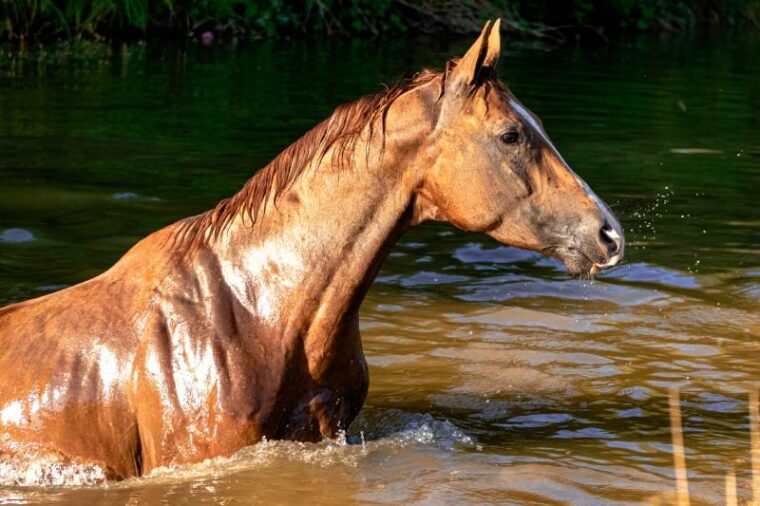
Horses are renowned for their speed and grace on land, but what about in the water? Horses are good swimmers that swim instinctively, much like other animals. Some horses are naturally strong swimmers, and others are less so. Horses can swim well due to their strong legs and the natural urge to hold their heads above water.
How Do Horses Swim?
Horses swim when in deep enough water by paddling like a dog, and they move in a similar way to when they’re trotting on land. This forward movement gives them momentum and keeps them stable in the water, allowing them to swim confidently.
Horses also have large lungs, capable of holding 55 liters of air, which makes them incredibly buoyant in the water. As a result, horses will swim and float, instinctually driving themselves forward to land if they suddenly find themselves out of their depth.

Do Horses Like Swimming?
Whether or not a horse likes swimming completely depends on the horse. Some horses will happily frolic into the water, while others will hesitate and rear up when faced with it. A horse’s reaction to water depends on their experiences with it, but horses in the wild have to cross water and deep rivers when fleeing from predators.
When pursued by predators, these horses needed the strength and bravery to crash and swim through moving water with strong currents, so an element of this instinct comes into play. Getting a horse used to swimming slowly is the key when first introducing them to water, as swimming for horses can have amazing health benefits but can also be dangerous.
Why Are Some Horses Wary of Water?
Each horse will differ regarding water, but there are a few reasons why a horse might not want to swim.
You can encourage a reluctant horse into the water by having it follow another. Horses are herd animals, so if a confident horse happily trots into the water to swim, the other might follow.

What Are the Benefits of Swimming for Horses?
There are several benefits of swimming for horses. Horses are commonly used for racing and shows, which require great cardiovascular health and endurance. Swimming is an excellent exercise that can help horses recover after an injury.
What Are the Negatives of Swimming for Horses?
As well as benefits, there are some drawbacks of swimming that horse owners should consider. Swimming can be dangerous for horses for a few reasons, so consider these points before taking the plunge:
Can Horses Swim in the Sea?
You can often see horses galloping along the shoreline with their owners and may wonder if they can swim in the sea. Of course, horses can swim in the ocean (and some might enjoy it), but swimming in open water has its own dangers and drawbacks.
Horses have long legs, so any uneven surface under the waves can injure them. If you want to swim with your horse in the sea, consider the following:
If you’re taking your horse out swimming in the sea, remember to consider others around you and whether the beach has any rules regarding horses and their riders.

Can You Ride Your Horse While It’s Swimming?
You can ride your horse while it’s swimming as long as you’re careful, but there might be better ways of swimming with your horse. Swimming is tiring for a horse after a while, and the extra weight of a rider can make them tire faster. If you ride your horse while swimming, keep an eye on them and ensure you exit the water while they still have stamina. The extra weight can also make it more difficult for your horse to float and keep its head up, so some riders choose not to ride while their horse is swimming. A horse shouldn’t have any riding gear on while swimming (except a bridle), as it can get caught up and impede the horse’s movement.
Conclusion
Swimming for horses comes naturally, and most will swim without issue. Whether they’ll like it (even though it’s an instinctual skill) is another question; some horses will take to water like ducks, while others will bolt at the sight of it. Horses can benefit greatly from swimming as it allows them to strengthen muscles and rehabilitate injuries while being weightless, but riders must take care to keep them safe.
Featured Image Credit: Au_Cr, Shutterstock








